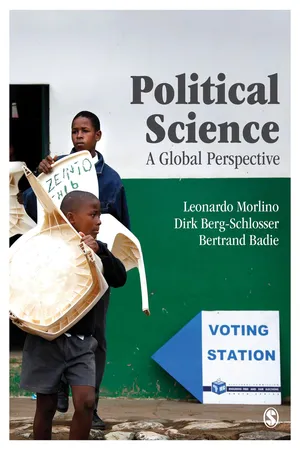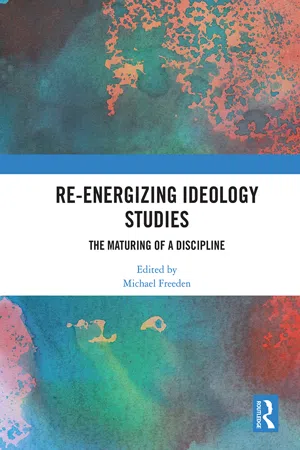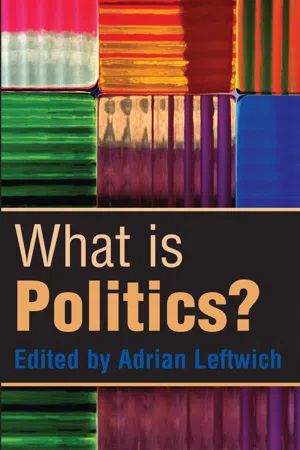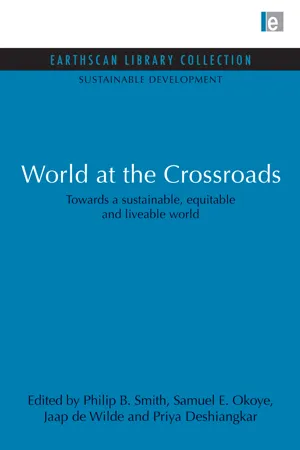Politics & International Relations
Internationalism
Internationalism is a political ideology that advocates for cooperation and collaboration among nations. It emphasizes the importance of global interdependence and the need for collective action to address global issues such as climate change, poverty, and conflict. Internationalism promotes the idea of a shared global community and seeks to promote peace and prosperity for all nations.
Written by Perlego with AI-assistance
Related key terms
Related key terms
1 of 4
Related key terms
1 of 3
4 Key excerpts on "Internationalism"
- eBook - ePub
Political Science
A Global Perspective
- Leonardo Morlino, Dirk Berg-Schlosser, Bertrand Badie(Authors)
- 2017(Publication Date)
- SAGE Publications Ltd(Publisher)
15 The Globalization of International PoliticsKey terms
- Constructivism (IR)
- Deterrence
- Geopolitics
- Hegemony
- Idealism (IR)
- Imperialism
- Liberalism
- Linkage
- Nuclear proliferation
- Peace
- Realism
- Washington consensus
Introduction
International relations (IR) have always been given a special status in political science. In a traditional perspective, it aimed to investigate the relationship among sovereign nation-states. We will see that this view has become very much questioned nowadays. In the USA, as well as in the UK, this discipline developed apart from political science, even if it was strongly influenced by theories, concepts and methods elaborated by political scientists. Moreover, in the UK, IR has always had a multi-disciplinary background, while in the USA its strong autonomy does not preclude its dominant political orientation. On the Continent and elsewhere in the world, IR is much more embedded into political science, even though the field is sometimes organized in separate professional associations. The way by which IR emerged as a discipline – or a sub-discipline – must be cautiously considered. In today’s world, IR studies tend to lose their own character and specificity, especially by the impact of globalization.Wars paved the way to a new sub-discipline
History must be taken into account for explaining the evolution of the main paradigms and the transformations of what international means (Buzan and Lawson, 2015). International relations were conceived as a discipline by the pressure of the two World Wars (Groom and Olson, 1991). In the context of the first one, peace studies were promoted, especially in the UK in the wake of the Great Illusion already published in 1910 by Norman Angell (Angell, 1910). Lowes Dickinson, Alfred Zimmern and others also strove to define the right conditions for building a world of peace (Dickinson, 1916; Zimmern, 1936). At this time, Aberystwyth University in Wales created the first professorship in International Relations. In France, solidarism (which considers that national as well as international order relies on a strong interdependence between actors) was blossoming from a Durkheimian vision of what international integration should be. In combination with Woodrow Wilson’s vision of a more institutionalized world, these first approaches led to the creation of the League of Nations - eBook - ePub
Re-energizing Ideology Studies
The maturing of a discipline
- Michael Freeden(Author)
- 2018(Publication Date)
- Routledge(Publisher)
Ideological analysis involves the study of diverse traditions of political thought and the way in which they relate to one another and to the social world more broadly. Within International Relations (IR), the sub-field of political science dedicated to the study of world politics, global affairs and relations between states, ideological analysis involves the study of the content, nature and effects of what I term here ‘international ideologies’. International ideologies are inter-subjectively held systems of thought consisting of basic claims concerning the nature of the international realm and the actors that populate it. They serve a primarily diagnostic function by helping individuals comprehend the nature of the international domain and understand the logics underpinning its operation. Many traditions of international thought are as well-known as their domestic counterparts, including realism, liberalism, Internationalism, globalism, cosmopolitanism, communitarianism, nationalism, idealism, militarism and related variants of these basic ideals. Each of these traditions embody divergent conceptions of core concepts associated with international relations, including sovereignty, anarchy, power, community, interest, institutions and the state.An in-depth analysis of these different interpretations is beyond the scope of this inquiry, which is concerned rather with the prominence of ideological analysis within the discipline of IR and the different ways in which scholars have sought to understand these traditions. Whilst ideological analysis has flourished in political science and political theory more broadly, IR as a discipline has proven surprisingly resilient to the idea that core traditions of international thought may be regarded as ‘ideologies’. This is in spite of the efforts of several prominent scholars to promote ideological analysis within IR. Ceadel, for example, in his 1987 book on the British peace movement, argued individuals disagreed about international questions because ‘they have different ideological preconceptions’, arguing in consequence that ‘the war and peace debate needs a general interpretive framework of the sort…long employed by students of domestic politics’.1 Some years later, in this journal, Bell sought to apply Freeden’s morphological approach to ideological analysis to ‘internationally oriented thought-structures’, coining the term ‘horizontal ideologies’ to denote patterns of belief that take as their subject-matter the relations between states or the nature of the international realm.2 - eBook - ePub
What is Politics?
The Activity and its Study
- Adrian Leftwich(Author)
- 2015(Publication Date)
- Polity(Publisher)
This chapter advocates a conception of politics as global politics. It argues that the traditional distinction between domestic and international politics has become a conceptual fiction which, despite its hold on the wider public imagination, no longer reflects the realities of a highly interconnected world. Politics and governance are becoming globalized as the terrorist attacks of 11 September 2001 and the subsequent events vividly demonstrate. As the world confronts a new century, the classic questions of political life have been re-posed with greater urgency, namely: who rules, in whose interests, by what means, and to what purpose? Addressing these questions intellectually, however, requires moving beyond the mythical ‘Great Divide’ – namely the separation of the study of Politics from the study of International Relations – which has fragmented scholarly political analysis since the birth of the modern state. Analysing global politics is a radical endeavour which involves putting the pieces back together, thereby reconstructing in the process the study of Politics and International Relations.In discussing the distinctive form and dynamics of global politics, this chapter will seek to address four key questions:- What is global politics?
- How is global politics to be understood?
- Where does power lie in global politics?
- Why does the study of global politics matter?
2 Politics Beyond Borders: Towards a Global Politics
Some time ago James Rosenau observed that, ‘Politics everywhere, it would seem, are related to politics everywhere else … now the roots … of political life can be traced to remote corners of the globe’ (cited in Mansbach, Ferguson et al., 1976: 22). As this paragraph took shape, the residents of Lee-on-the-Solent, a small English seaside town in Hampshire, could be heard some streets away, protesting against Home Office proposals to place an asylum centre in the town. Political oppression and economic collapse in distant nations have generated controversy in a normally quiescent residential village. By contrast, the Jubilee 2000 campaign brought together a global coalition of aid, development, religious, human rights and women’s organizations from across the North–South divide to campaign for the abolition of Third World debt. Coordinated campaigns within the national capitals of the G7 states (the USA, the UK, France, Italy, Germany, Japan and Canada) and at the G7 summits in the late 1990s forced the issue on to the global agenda and compelled a subsequent G7 policy response. Both these cases are manifestations of contemporary political globalization: namely, the intensification of worldwide political interconnectedness encompassing transnational policy problems, new systems of global regulation, political action at a distance and transnational solidarities. - eBook - ePub
World at the Crossroads
Towards a sustainable, equitable and liveable world
- Philip B. Smith, Samuel E. Okoye, Jaap de Wilde, Priya Deshingkar(Authors)
- 2013(Publication Date)
- Routledge(Publisher)
Together they may fit a pragmatic but normative political programme that offers a realistic alternative for political extremism in response to crises; a comprehensive alternative for superficial reactions. Political science can contribute to the coherence of such a programme. By understanding that power is a culture and situation bound property, by understanding the importance of constructional interdependence, by recognizing the globalization of geopolitics, by counting on the growing role of IGOs and NGOs, by recognizing the discrepancy between global and individual dimensions, it may become possible to deal comprehensively with the population, food, energy and economic problems that will dominate politics for the coming decades, and to help stop the disruption of ecosystems and the militarization of societies.REFERENCESBrock, Lothar, ‘Peace through Parks. The Environment on the Peace Research Agenda’, Journal of Peace Research , vol 28, no 4,1991, pp 407–22.Brown, Lester R, ‘A New Era Unfolds’, in L R Brown, et al, (eds), State of the World, 1993, London: Earthscan Publications, 1993, pp 3–21.Brown, Neville, ‘Climate, Ecology and International Security’, Survival, vol 31, no 6, 1989, pp 519–32.Carr, E H, The Twenty Years’ Crisis, 1919–1939. An Introduction to the Study of International Relations , London: Macmillan, (1939) 19402 .Dougherty, James E and Robert L Pfaltzgraff, Jun, Contending Theories of International Relations. A Comprehensive Survey, New York: HarperCollins, 19903 .Gilpin, Robert, The Political Economy of International Relations, Princeton: Princeton University Press, 1987.Homer-Dixon, T, ‘On the Threshold: Environmental Changes and Acute Conflict’, International Security, vol 16, no 2,1991, pp 76–116.Homer-Dixon, T, J H Boutwell and G Rathjens, ‘Environmental Change and Violent Conflict’, Scientific American, February 1993, pp 16–23.Jongman, Berto, ‘Oorlog en politiek geweld’ in Bert Bomert and Herman de Lange (eds), Jaarboek Vrede en Veiligheid 1992, Nijmegen: SW Cahier 56, pp 27–39.MacNeill, Jim, Pieter Winsemius and Taizo Yakushiji, Beyond Interdependence. The Meshing of the World’s Economy and the Earth’s Ecology
Index pages curate the most relevant extracts from our library of academic textbooks. They’ve been created using an in-house natural language model (NLM), each adding context and meaning to key research topics.
Explore more topic indexes
Explore more topic indexes
1 of 6
Explore more topic indexes
1 of 4



